Commentary on Proverbs 11:5
Verse: "The righteousness of the perfect shall direct his way: but the wicked shall fall by his own wickedness."
Introduction
The Book of Proverbs is a compilation of wisdom literature that provides practical guidance for living a life aligned with God's principles. Proverbs 11:5 highlights the dichotomy between the righteous and the wicked, emphasizing moral integrity and its implications for one's life journey. The following commentary draws upon the insights of renowned public domain theologians including Matthew Henry, Albert Barnes, and Adam Clarke.
Exegesis of the Text
In this verse, Solomon asserts that the righteousness of a perfect person—the one who is morally upright and strives to live in accordance with God's laws—serves as a guiding force in their life. Contrastingly, those who engage in wickedness will inevitably face consequences resulting from their own actions.
Insights from Matthew Henry
On Righteousness: Matthew Henry emphasizes that true righteousness is not merely moral externality but encompasses inner character and virtue. He notes that the "perfect" refers not to sinless perfection, but rather to a complete and whole-hearted devotion to God. This completeness allows an individual to navigate life's challenges with divine wisdom.
On Divine Guidance: Henry points out that righteousness offers direction. Just as a compass points to true north, a righteous life provides clarity in moral decision-making. This divine guidance prevents one from straying into destructive behavior.
On the Fate of the Wicked: Regarding the wicked, Henry declares that their downfall is self-inflicted. Their wickedness leads to a trap of their own making, illustrating the biblical principle that one reaps what they sow (Galatians 6:7).
Insights from Albert Barnes
On the Path of Righteousness: Albert Barnes interprets "the perfect" as those who walk in integrity and sincerity. He asserts that their path is illuminated by their adherence to God's law, which serves both as a moral compass and a source of strength against the trials of life.
Wickedness as Self-Destructive: Barnes elaborates on the nature of wickedness, explaining how it leads to confusion, distress, and ultimately falls upon the perpetrator. His commentary reflects the biblical acknowledgment of the natural consequences of sin, reinforcing the importance of choosing the path of righteousness.
Insights from Adam Clarke
The Characteristics of the Righteous: Adam Clarke notes that the term "perfect" indicates a person who is entirely virtuous and obedient to God's commandments. Clarke argues that such individuals not only receive guidance from their moral standing but also gain favor in their endeavors.
The Portent of Wickedness: Clarke discusses the nature of the wicked person's fate. He emphasizes that their decline is not only moral but also practical, as they may initially prosper but will ultimately face ruin. Their wickedness disrupts their lives, leading to isolation, regret, and downfall.
Theological Implications
- The Nature of Righteousness: This verse invites reflection on the character of God, who is perfectly righteous. Understanding righteousness leads to a deeper appreciation of God’s nature as well as the call for believers to emulate that character.
- Divine Justice: The theme of divine justice is prevalent; the verse articulates the principle that God will not allow wickedness to triumph indefinitely. The moral government of God ensures that actions have consequences.
- Practical Application for Believers: For pastors and leaders, the call to uphold righteousness is crucial as they serve as examples in their communities. They are reminded that their integrity significantly impacts their effectiveness in ministry.
- Encouragement for the Faithful: Believers are reassured that their struggles and righteous choices are not in vain. God honors those who seek to live righteously, guiding their paths even amid adversity.
Conclusion
Proverbs 11:5 encapsulates the profound truth that holiness and integrity play a critical role in a believer's journey. The poignant contrast between the righteous and the wicked serves as a reminder of the timeless principles that govern human conduct and divine oversight. As pastors, students, theologians, and scholars reflect on this wisdom, they are called to embrace righteousness, trusting that it will direct their paths and serve as a bulwark against the chaos of wickedness.


